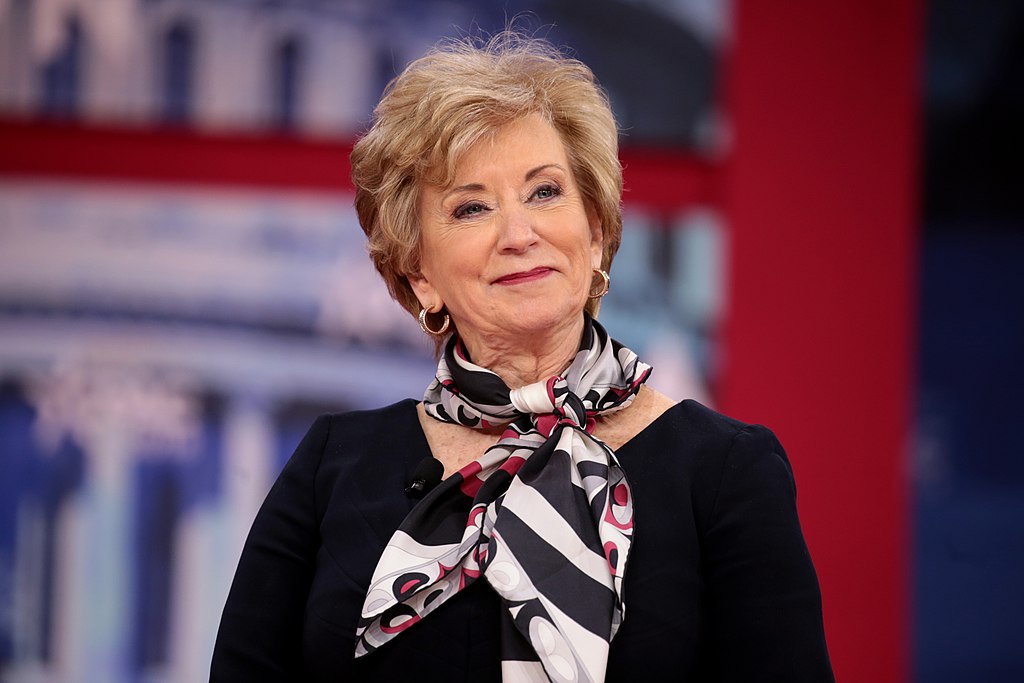Former WWE executive Linda McMahon, tapped by Donald Trump to lead the Department of Education, announced plans to transfer significant control of education policies back to the states. The controversial move has sparked heated debates, with critics arguing that such decentralization could exacerbate existing inequalities in public education.
Linda McMahon’s Vision for State-Led Education Reform
During a press briefing on Wednesday, McMahon emphasized the need to dismantle what she described as “bureaucratic overreach” in federal education. She outlined the administration’s intention to empower states to make localized decisions regarding curriculum, funding, and school standards.
“Our goal is to return decision-making power to where it belongs—the states and the communities,” McMahon stated, adding that this approach would allow for greater adaptability to regional educational needs.
Advocates for the policy argue that decentralization can foster innovation and reduce inefficiencies caused by federal mandates. However, critics worry that such a shift may lead to reduced accountability and widen disparities in access to quality education, particularly in underfunded districts.
Critics Raise Concerns Over Education Inequities
Education experts and advocacy groups have voiced apprehensions over the implications of McMahon’s proposals. Some believe that relinquishing federal oversight could weaken protections for vulnerable student populations, including those with disabilities and students in marginalized communities.
Dr. Karen Hughes, a professor of educational policy at Harvard University, noted, “While local control offers certain benefits, it also risks creating a patchwork system where student outcomes vary dramatically based on geography and funding availability.”
Netizens were quick to react, with social media erupting into debates about the policy’s potential impact on public education:
- @EdRightsActivist: “State control sounds great until you realize it could gut protections for disabled students and underfunded schools.”
- @ParentAdvocateNY: “Local control means more parents can have a say. Why are people afraid of community decision-making?”
- @TeachEquality: “This is a disaster in the making. Federal oversight ensures fairness across the board.”
- @ConservativeMom: “Finally, an education leader who gets it. Big government doesn’t belong in our schools!”
- @EdReformExpert: “The devil’s in the details. Decentralization could either be brilliant or a total catastrophe.”
- @PolicyWatcher: “Removing federal oversight will open Pandora’s box. Inequality in education is already bad enough.”
Implications for Federal Education Policies
If implemented, McMahon’s vision would mark a seismic shift in U.S. education policy. Key programs, including Title I funding for low-income schools and special education mandates, may be impacted. The administration has yet to clarify how federal funding allocations will adapt to these changes or what safeguards will be put in place to prevent inequality.
Experts warn that such reforms may face legal challenges, particularly in states where existing disparities in educational resources are already under scrutiny. Meanwhile, McMahon has promised further consultations with stakeholders to address concerns before finalizing the policy framework.



 U.S.-Israel War on Iran Escalates as Gulf Conflict Disrupts Oil, Air Travel and Regional Security
U.S.-Israel War on Iran Escalates as Gulf Conflict Disrupts Oil, Air Travel and Regional Security  UK Accepts U.S. Request to Use British Bases for Defensive Strikes on Iranian Missiles
UK Accepts U.S. Request to Use British Bases for Defensive Strikes on Iranian Missiles  Trump Launches Operation Epic Fury: U.S. Strikes on Iran Mark High-Risk Shift in Middle East
Trump Launches Operation Epic Fury: U.S. Strikes on Iran Mark High-Risk Shift in Middle East  Why did Iran bomb Dubai? A Middle East expert explains the regional alliances at play
Why did Iran bomb Dubai? A Middle East expert explains the regional alliances at play  Trump Warns Iran as Gulf Conflict Disrupts Oil Markets and Global Trade
Trump Warns Iran as Gulf Conflict Disrupts Oil Markets and Global Trade  U.S. Deploys Tomahawks, B-2 Bombers, F-35 Jets and AI Tools in Operation Epic Fury Against Iran
U.S. Deploys Tomahawks, B-2 Bombers, F-35 Jets and AI Tools in Operation Epic Fury Against Iran  Melania Trump Chairs Historic U.N. Security Council Meeting on Children Amid Iran Conflict
Melania Trump Chairs Historic U.N. Security Council Meeting on Children Amid Iran Conflict  Australia Rules Out Military Involvement in Iran Conflict as Middle East Tensions Escalate
Australia Rules Out Military Involvement in Iran Conflict as Middle East Tensions Escalate  Suspected Drone Strike Hits RAF Akrotiri Base in Cyprus, Causing Limited Damage
Suspected Drone Strike Hits RAF Akrotiri Base in Cyprus, Causing Limited Damage  Russia Signals Openness to U.S. Security Guarantees for Ukraine at Geneva Peace Talks
Russia Signals Openness to U.S. Security Guarantees for Ukraine at Geneva Peace Talks  Trump Says U.S. Combat Operations in Iran Will Continue Until Objectives Are Met
Trump Says U.S. Combat Operations in Iran Will Continue Until Objectives Are Met  AI is already creeping into election campaigns. NZ’s rules aren’t ready
AI is already creeping into election campaigns. NZ’s rules aren’t ready  Middle East Conflict Escalates After Khamenei’s Death as U.S., Israel and Iran Exchange Strikes
Middle East Conflict Escalates After Khamenei’s Death as U.S., Israel and Iran Exchange Strikes  Supreme Court Backs GOP Lawmaker in New York Redistricting Fight Ahead of Midterms
Supreme Court Backs GOP Lawmaker in New York Redistricting Fight Ahead of Midterms  Israel Strikes Hezbollah Targets in Lebanon After Missile and Drone Attacks
Israel Strikes Hezbollah Targets in Lebanon After Missile and Drone Attacks  Does international law still matter? The strike on the girls’ school in Iran shows why we need it
Does international law still matter? The strike on the girls’ school in Iran shows why we need it  Trump Says U.S. Attacks on Iran Will Continue, Warns of More American Casualties
Trump Says U.S. Attacks on Iran Will Continue, Warns of More American Casualties 



























